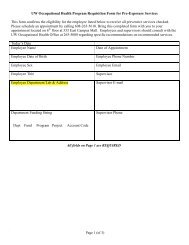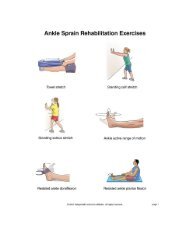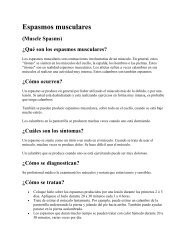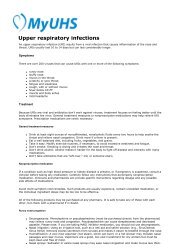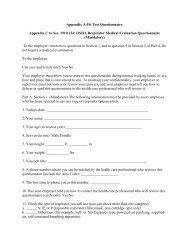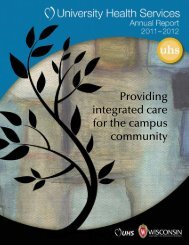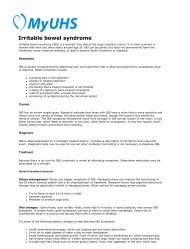HealthPoint Patient Ed
HealthPoint Patient Ed
HealthPoint Patient Ed
You also want an ePaper? Increase the reach of your titles
YUMPU automatically turns print PDFs into web optimized ePapers that Google loves.
MononucleosisInfectious mononucleosis (more commonly known as mono) is an illness usually caused by the Epstein-Barrvirus, spread through saliva. The length and severity of illness varies between individuals. Some people caneven have mono without being aware that they are infected.SymptomsMono is most commonly characterized by the following symptoms:●●●●sore throatfatigueswollen glands (enlarged lymph nodes) in the neck and possibly elsewhereenlarged tonsils, sometimes covered in pusAdditional symptoms may also be present, including:●●●●●●feverheadachenauseamuscle achesrashenlarged spleen (the organ that lies under the left-side of the rib cage)The time between when a person is exposed to mono and when symptoms appear is around 30 to 50 days.Fever and sore throat usually go away first, but fatigue and lymph node swelling may last for one to twomonths. Mono is most contagious during this first period, when the fever and sore throat are present.DiagnosisMono can be confirmed by a blood test. When mono is present, a particular type of white blood cell called areactive lymphocyte is frequently seen in the blood. A “Monospot” blood test may not give positive results untila week or more after symptoms develop.If the test results don’t show mono at first but mono seems very likely, the test may be repeated. In somecases, a person with mono may not test positive at all.TreatmentGeneral treatment measures:●●●●Drink at least eight ounces of non-caffeinated, non-alcoholic fluids every two hours. If a fever ispresent, more fluids are needed to replace those lost because of elevated body temperature. Extrafluids can also help soothe a sore throat.Rest more than usual if very tired, and stay in bed while the fever is present. Long-term bed rest orleaving school is rarely necessary.Do not drink alcohol for four to six weeks. Mono affects the liver, which is where alcohol is brokendown in the body.Sometimes the spleen can become enlarged or inflamed, so avoid blows or pressure to the chest orabdomen for a month after symptoms begin. Strenuous physical activity, heavy lifting, or a hardimpact could rupture the spleen, requiring emergency medical attention.
Sore throat:●●●●●●●Significant throat pain may accompany mono. To soothe a sore throat, try the following:Avoid dry air, if possible. Humidifiers, which add moisture to the air, can make sleeping easier andreduce nasal irritation.Refrain from smoking, which irritates the throat and nasal tissue.Eat a well-balanced diet.Sip hot water mixed with honey and lemon. Honey coats and soothes the throat, while lemon helpsclear away mucus.Use phenol-containing lozenges and sprays—these are particularly effective pain relievers for sorethroats.Gargle with warm salt water (1 teaspoon salt in 1 cup hot water) three to four times a day. This mayhelp to ease pain and clear throat mucus.Nasal congestion:●●●Decongestants: Phenylephrine (or pseudoephedrine, which must be purchased directly from thepharmacist) may relieve runny nose and congestion. Pseudoephedrine can cause sleeplessness anddecreased appetite.Nasal irrigation: Using an irrigation tool, such as a neti pot and saline solution (e.g., SinuCleanse,Sinus Rinse), removes excess secretions from sinuses and makes breathing through the nose easier.Nasal sprays: Saltwater or saline nasal sprays may ease nasal congestion and make mucus less thick.Do not use medicated over-the-counter nose sprays (such as Afrin) for more than three days.Excessive use of such sprays can cause dependence and may make congestion worse.Fever and pain:Much of the discomfort of mono is because of the fever and sore throat. Many painkillers can both ease thethroat and reduce a fever. These products are commonly available without a prescription, and can bepurchased at any pharmacy.For acetaminophen, aspirin, and ibuprofen, use according to the label directions to reduce fever and/or pain. Ifsymptoms are severe, alternate acetaminophen (650 mg) and ibuprofen (400 mg) every two hours. If underthe age of 19, do not use aspirin, as it can contribute to Reye’s syndrome—a life-threatening illness of thebrain and liver that usually follows a viral infection in children or teenagers.Prescription medications:●●●●No prescription medications can treat mono. Mono is a virus, meaning that antibiotics, which killbacteria, won’t help. Sometimes complications occur, however, and medication may be necessary.If infections such as strep throat or sinusitis occur during mono, antibiotics will be prescribed to treatthem.Do not take amoxicillin, as a drug-related rash may occur.In rare cases where the tonsils are very large and could interfere with breathing, a steroid may beprescribed to reduce their size.PreventionSince mono is generally spread through saliva (thus the nickname the “kissing disease,”) intimate partners aremost at risk for catching mono. Roommates are no more likely to catch mono than anyone else.Good hygiene, with frequent hand washing, helps prevent many illnesses, including mono. Until the symptomsare gone, do not engage in any activities where saliva may be exchanged, such as:●●●●kissingsharing food or drinksusing the same eating utensilsdrinking from the same containersWash eating and drinking utensils and dishes in hot, soapy water, and ask others to do the same.Once an individual has had mono there is usually permanent protection against being infected with that kind ofmono again. Mono caused by other viruses, however, could still potentially occur.
When to contact a clinicianReport any pain in the left upper area of your abdomen or in your shoulder immediately.[HU425: Updated 07/08]


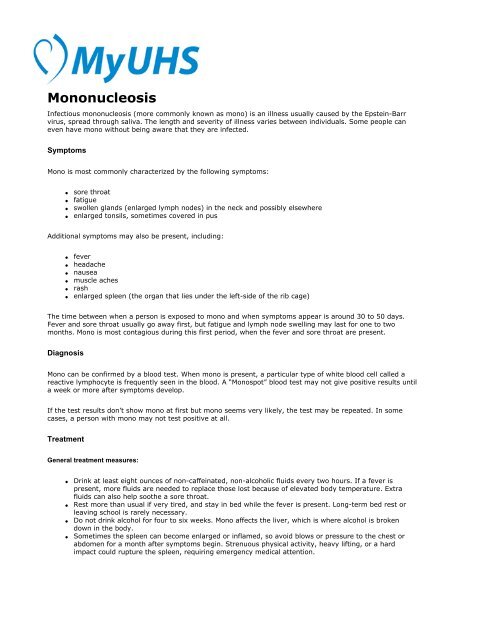
![Prescription Drug Formulary [pdf]](https://img.yumpu.com/51301099/1/190x245/prescription-drug-formulary-pdf.jpg?quality=85)
